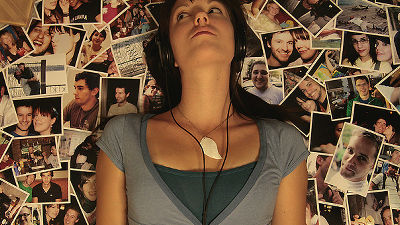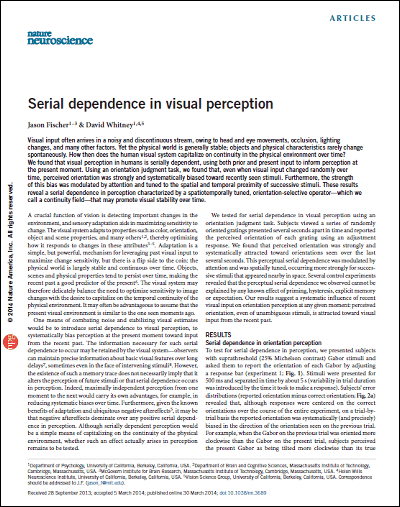Research results show that the 'present' you are feeling now is the culmination of perception over the last 15 seconds

By
There is a certain time lag between human perception and cognition in the brain, and I heard the theory that 'what we feel'now'actually occurred 0.5 seconds ago.' I think there are many people, but research results have also been published that the recognition is influenced by the information perceived in the last 15 seconds.
Your reality is 15 seconds in the making --Quartz
http://qz.com/193708/your-reality-is-15-seconds-in-the-making/#/h/59390,1,59397,2/
(PDF file) Serial dependence in visual perception --Fischer_Whitney_NN_2014r.pdf
https://whitneylab.berkeley.edu/PDFs/Fischer_Whitney_NN_2014r.pdf

Jason Fisher, a postdoctoral fellow at the University of California, Berkeley, examined the perceptual effects of changing attention objects in a short amount of time. As a result, it turned out that what people perceive at a certain point is not only what they saw at that moment, but also a mixture of what they saw for about 15 seconds before that. did. The report calls this temporary cognitive ability a ' continuity field ' and explains how we pay attention to the object.
In this paper, entitled 'Serial dependence in visual perception,' a linear pattern called a 'gabor patch' was displayed to a subject on a computer screen for 0.5 seconds. The results are shown when the test for about 5 seconds was performed multiple times in a row to answer the angle at which is tilted to the left and right.

As most expected, there was basically a tendency to remember the direction of the patch you saw most recently, but some answers were influenced by the memory of the patch you had seen so far. , It became clear that the angle of inclination was sometimes answered loosely. For example, if the last patch that appeared was tilted 45 degrees to the right, but the previous three patches were tilted to the left, subjects would tend to respond with the angle of the last patch less than 45 degrees. It was. This decrease indicates that even if we perceive things with our eyes, our perception may be affected by the events immediately preceding them in our brain.
Since the number of experiments conducted in this verification is limited to 12, further verification is required in the future. According to Fisher, this type of research has rarely been done so far, and this verification will be the first step into a new field.
If this 'continuous field of view' is real, Fisher says it is 'to allow you to focus on multiple objects at the same time.' If we don't have that ability, our attention will stick to one point, for example, when driving a car on a rainy day, the windshield will only be focused on the raindrops and the others. It is said that you will be in a situation where you cannot look at it.

By Hasin Hayder
Mr. Fischer plans to proceed with similar verification with other senses such as hearing, and he hopes that it will deepen his understanding of symptoms such as autism and hyperactivity syndrome.
Related Posts:
in Science, Posted by darkhorse_log






